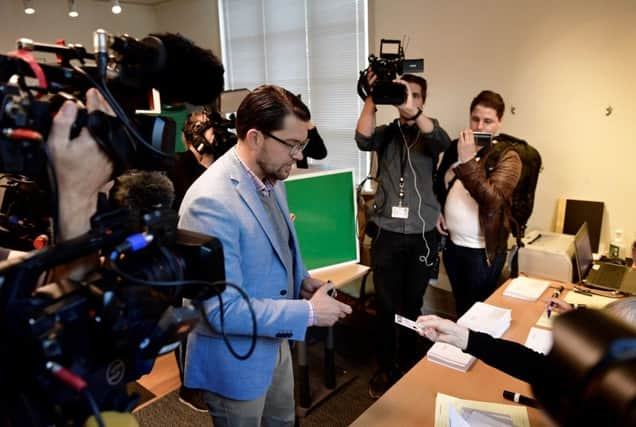Lesley Riddoch: The Swedes can resist the far right


Sunday’s elections will doubtless show a rise in support for the far-right Sweden Democrats (SD). Several opinion polls had placed them second, behind the Social Democrat Party (SAP) - Sweden’s traditional party of government - and ahead of the centre-right Moderates.
The prospect of such a political shift has made headlines across the world. Of course, every country is grappling with the same problem - public hostility to immigration in the aftermath of wars in Libya, Iraq, Afghanistan, Syria and beyond. But let’s be honest. There’s also a good deal of schadenfreude about Sweden’s predicament. This country of almost ten million people has created one of the world’s most equal societies since the Social Democrats first came to power in 1917. Whilst other countries like Britain have found it almost impossible to control or regulate capitalism, the Swedes have made big strides. As a result, their income gap is the world’s smallest; their childcare and maternity/paternity care are excellent and their elderly care is widely regarded as the best in the world. On a trip to Sweden’s southern province of Skane, industrialist and Swedish Consul to Scotland Torvald Colliander took me to see the council-run old folk’s home where his mother lived and died. He proudly showed me his own name on the application list. “In Sweden,” he told me, “the only fear is that you wont get into the council home and might have to go private instead.” Public services are that good. Consequently, private provision is rare, everyone uses the same school, doctor and dentist regardless of social background and the wealthy keep on paying tax.
Advertisement
Hide AdAdvertisement
Hide AdSo far it’s worked. The Swedes have been the living embodiment of Richard Wilkinson and Kate Pickett’s best-selling book; The Spirit Level, which demonstrates that everyone benefits from an equal society – including the rich. Additionally, the Swedes have the highest rates of innovation in the EU and union membership is three times higher than in Scotland.
In short, the Swedes have been at the top of every international league table for decades – provoking admiration, envy and outright hostility in almost equal measure.
In 1960, American president Eisenhower said Sweden’s welfare state had led the country into an orgy of sex, socialism and suicide. In fact, Sweden was the only country on earth to rival the GDP of post war America, so it was politically inconvenient to discover that a tiny Nordic nation was evolving a more humane Third Way between the command economy and the unfettered free market.
Some of Eisenhower’s mud stuck and over the years, politicians in less equal societies have grown weary of Sweden’s apparently effortless social and economic success. So there’s a smug wee smile now that Sweden’s suffering from an ugly outbreak of the same racism, intolerance and hostility experienced by other countries with lower standards and more wobbly moral compasses. It seems that under pressure, the Swedes react no better than anyone else. You can almost hear the collective sigh of relief from politicians, TV viewers and even activists.
But Sweden’s predicament is not quite so simple.
There is absolutely no parallel between the number of refugees and economic migrants accepted into Sweden and any other country – not in Germany and most definitely not in the UK.
In 2015, one in six people living in Sweden was born outside the country. That’s a dramatic change from the almost totally homogenous, white society that prevailed in Sweden until the 1960s. Like the other Nordic nations, the Swedes had no empire, Commonwealth or experience of different ethnicities arriving gradually as economic migrants over a century as Britain did. Instead, Swedish society changed fairly rapidly – the first influx of refugees came after the Yugoslavian conflict and then in 2014, the country accepted 80,000 mostly Syrian asylum seekers – proportionally more than any other country in Europe. That produced other problems, many of them peculiar to Sweden’s high skills economy.
In 2015, 35,000 children arrived in Sweden as asylum seekers without parents. Families in war-torn countries heard Sweden was giving permanent residence permits to all Syrians seeking asylum and many managed to scrape the money together to send over one child apiece. That child was often a teenager, without a word of Swedish.
In Britain, by contrast, migrants and asylum seekers arrive with a basic grasp of English and can find casual jobs without qualifications. Essentially, Britain’s world of low-pay, zero-hour contracts, means immigrants can get a start. New arrival in Sweden by contrast, often cannot, which leads to unemployment and housing segregation. Still, the ‘refugee crisis’ is not a part of everyday life. Society hasn’t collapsed and Swedes are still more welcoming to incomers than folk from other EU countries.
Advertisement
Hide AdAdvertisement
Hide AdAccording to a Europe-wide survey published last year, 64 per cent of Swedes are positive to immigrants from outside the EU compared to 37 per cent across the EU itself. So the big question is not whether the Sweden Democrats will increase their vote but whether that gives them any meaningful political clout. Every other party has rejected the idea of forming a coalition, and whilst that may create awkward bedfellows amongst the other parties, there’s a strong incentive to make common cause. But whilst British voters are quite used to seeing large bodies of political opinion frozen out of power as a result of First Past the Post voting, the Swedes with their fully proportional voting system are not. Will exclusion fuel support for the Sweden Democrats or will mainstream parties cooperate, contain the threat and devise innovative ways to boost integration? Despite support from prominent eugenicists in the Nazi era, far-right ideology did not overtake Sweden in the 1940s. The Swedes can resist it again.